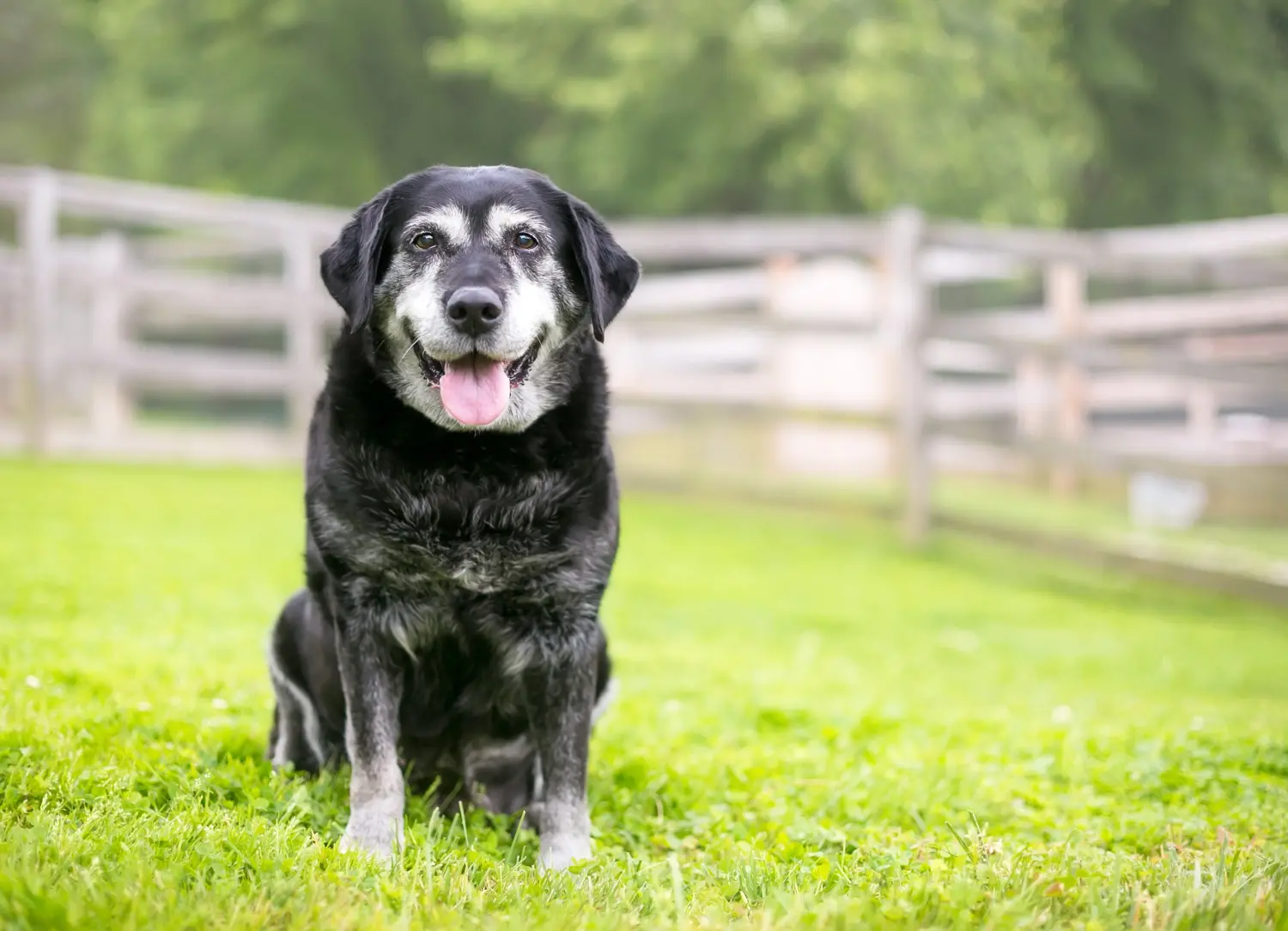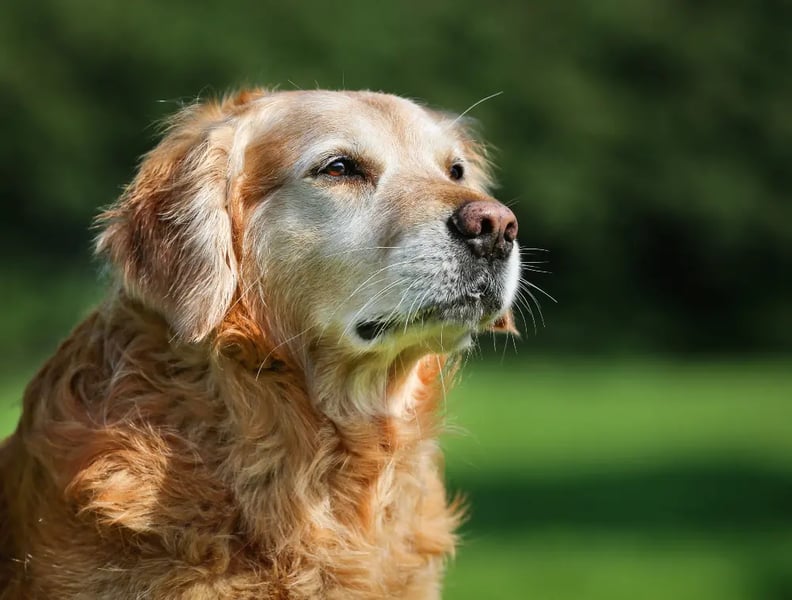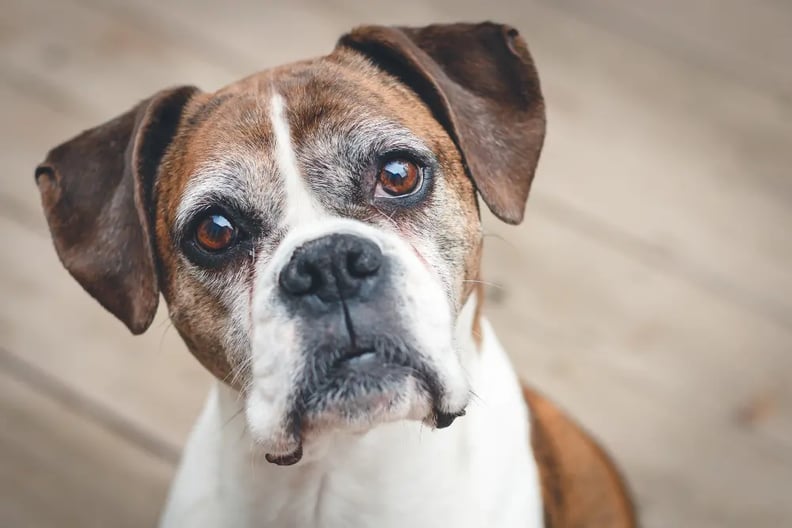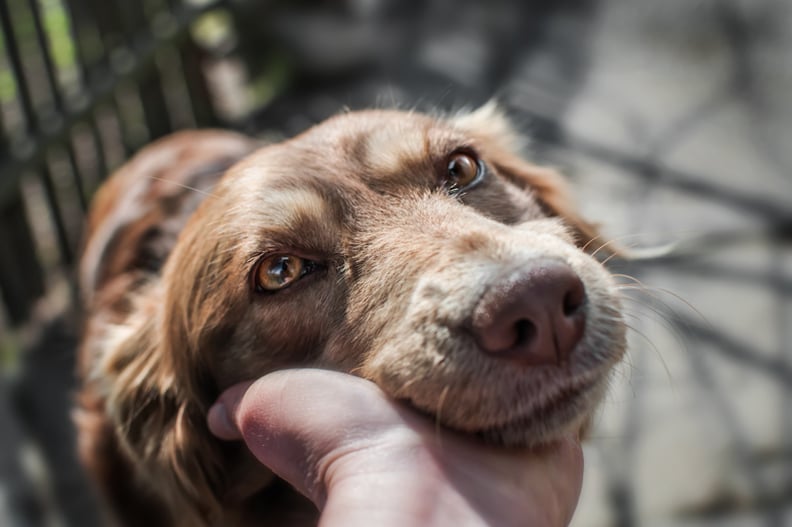
Caring for a senior dog is a heartwarming and rewarding experience that comes with its unique set of challenges and joys. As your loyal companions age, their needs change, requiring us to provide them with extra love, attention, and specialized care to ensure their golden years are comfortable and fulfilling.
In the journey of companionship, it's essential for pet parents to be well-informed about the specific requirements of their aging furry friends.
In this guide, we'll explore what it takes to care for an old dog and look at the various aspects of their well-being as they advance over the years. You'll learn how to calculate dog years, how to prevent and manage common senior dog issues, and how to identify signs of aging.
From tailored nutrition and regular veterinary check-ups to modified exercise routines and mental stimulation, the care we provide our elderly dogs plays a vital role in enhancing their quality of life and perhaps even adding years to their lifespan.
Signs that Your Dog is a Senior
Just like humans, senior dogs undergo physical and behavioural changes that demand a compassionate and understanding approach.
Pets age differently depending on breed, size, genetics, and environment. The huge variety of breeds and mixed breeds can make it even more difficult to determine at what age a dog enters their senior stage.
Whether discussing larger or smaller breeds, varied factors can ultimately determine your dog's expected lifespan.
Keep an eye out for signs or symptoms of age-related decline. The signs may not be obvious. They are often quite subtle and easy to miss until they are well advanced.
When is your dog a senior?
There are many factors that can determine when your pet needs to be cared for as a breed senior, but the most common standard is about 7.
The classification of a dog as a senior can vary depending on the breed, size, and overall health of the individual dog.
As a general guideline:
-
- Toy and Small Breeds: Dogs that are smaller in size, such as Chihuahuas, Dachshunds, and Toy Poodles, are often considered seniors around the age of 7-10 years old.
- Medium: Medium-sized dogs, like Bulldogs, Beagles, and Australian Shepherds, are typically classified as seniors between the ages of 6 to 8 years old.
- Large and Giant Breeds: Larger and giant breeds, such as Great Danes, German Shepherds, and Rottweilers, tend to have shorter lifespans and may be considered seniors as early as 5 to 6 years old.
It's important to note that these age ranges are simple generalizations, and individual dogs may age differently based on factors such as genetics, overall health, and lifestyle. Some dogs may show signs of aging earlier or later than the typical age ranges mentioned above.
Regardless of the specific age, it's crucial to pay attention to your dog's behaviour, energy levels, and overall health. Regular veterinary check-ups are essential as your dog enters their senior years, allowing your veterinarian to monitor their health, detect potential issues early, and provide appropriate care and guidance tailored to their age-related needs.
How Old Are Dogs in Human Years?
The idea that one dog year is equivalent to seven human years is a common misconception. The relationship between dog years and human years is not as straightforward as a simple multiplication. Dogs age more rapidly in their early years and then slow down as they age. Learn how many dog years in one human year:
-
- For the first year: A medium-sized dog's first year is roughly 15 human years.
- For the second year: Add another nine years for a total of 24 human years.
- Each year after that: Add about four human years for every dog year.
This method varies based on the dog's size and breed, as smaller breeds tend to live longer than larger breeds. It's essential to consider these factors for a more accurate estimation of your dog's age in human years.
How Active Should Your Senior Dog Be?
To answer this, you need to understand your dog's current physical and mental state. Just like people, your dog's routine needs to be adjusted according to what they are currently capable of.
A lazy, old dog can't just jump into an advanced physical routine without overexerting itself. Adjustments need to be made slowly. Think baby steps. The less active your pet is, the slower you will need to introduce new activities.
Maintaining activity in your old dog is an important part of keeping them healthy and happy as they age. Keeping your senior dog active is not just about maintaining physical health; it's also crucial for their mental and emotional well-being.
While senior dogs may have different energy levels and limitations compared to their younger counterparts, engaging them in regular, gentle exercise and mental stimulation can enhance their overall quality of life and contribute to a longer, happier retirement.
In this article, What Does My Dog Need, we clarified different classifications of activity levels in dogs:
-
- Low Activity - 30 minutes of physical activity + casual playtime
- Moderate Activity - 30 minutes-1 hour of physical activity + regular playtime
- High Activity - 1+ hours of physical activity + active playtime
While these categories still stand true for senior pets, the types of physical activity and play time may change.
-
- A 30-minute run for an active dog might be a 30-minute walk for a senior.
- A high-energy game of fetch in the backyard might be a slow game of hide and seek instead.
If you have a senior pet that is still quite spry, that's great. Maintaining physical activity should be a breeze, but monitor your pet in the hours or days after high-energy playtime.
This is when you might notice some mobility issues developing and is a good indicator that you may need to shorten or break up playtime a little.
A happy puppy doesn't know that they're going to be sore after a play day at the dog park. It's up to us to make sure that we are encouraging appropriate exercise.
For most aging dogs, dividing playtime into shorter segments and spreading them throughout the day is a wonderful way to maintain their activity levels without taxing their aging bodies too much.
Tips on Caring for a Senior Dog

Caring for an old dog requires a special blend of attention, patience, and love. As our loyal companions age, they often require tailored care to ensure their comfort, happiness, and overall well-being.
Here are essential tips to consider when caring for your aging canine friend:
Regular Veterinary Check-ups for Older Dogs
If your old dog seems healthy, it’s still a good idea to maintain yearly (or more frequent) health exams. Schedule frequent visits to the vet for comprehensive health assessments. Regular check-ups help monitor your dog's overall health, detect potential issues early, and ensure they receive appropriate medical care.
Balanced Nutrition for Senior Dogs
Senior-specific formulas often contain ingredients that support joint health and aid digestion, addressing common issues associated with aging. At Homes Alive Pets, we carry a wide assortment of senior dog food formulas.
Senior foods are crafted specifically to cater to the unique needs of aging dogs. These formulas are carefully designed to provide optimal nutrition, ensuring your senior canine companion enjoys a healthy and happy life.
With our diverse selection of foods, you can find the perfect senior dog food formula to support your pet's joint health, digestion, and overall well-being, allowing them to thrive in their golden years.
Comfortable Living Environment
Make your home senior-dog friendly by providing soft, supportive bedding such as an orthopedic bed and easy access to food, water, and outdoors. Consider placing ramps or steps to help them climb onto furniture or into vehicles without straining their joints.
Regular Exercise
Engage your old dog in gentle, low-impact exercises suitable for their age and physical condition. Short, leisurely walks and light play sessions can help maintain their mobility and mental stimulation. Play a game of soft fetch. You don’t have to throw the ball a great distance to make your dog run far away to have fun.
Dental Care
Dental problems are common in older dogs. Regular teeth brushing and dental check-ups with your pup’s veterinarian are vital to prevent pain, infections, and other related health issues. Invest in chews and dog toothpaste to encourage good dental hygiene.
Mental Stimulation
Keep your senior dog mentally active with puzzle toys, interactive games, and positive reinforcement training. Mental stimulation helps keep their minds sharp and alleviates boredom.
Regular Grooming
Older dogs may require more frequent grooming, especially if they have mobility issues. Regular brushing not only keeps their coat clean but also allows you to check for any lumps, bumps, or skin issues.
Pain Management
If your dog suffers from arthritis or other painful conditions, consult your vet for pain management options. Medications, supplements, or physical therapy can significantly improve their quality of life.
At Homes Alive Pets, you’ll find many supplements that promote digestion, pain relief, and joint and hip health in elderly dogs.
Common Senior Dog Problems & Frustrations

Caring for an old dog involves recognizing and accepting their limitations, both physical and mental, with compassion and empathy. Just like humans, aging dogs might experience aches, pains, and decreased mobility due to conditions such as arthritis or joint stiffness. They might also face cognitive challenges, like confusion or memory loss, which can affect their behaviour and response to stimuli.
Many old dogs feel frustrated and become grumpy. It's essential to be patient and understanding of your furry friend.
Providing gentle guidance means understanding that tasks your dog once found easy may now require more time and effort. Always be understanding if they move more slowly, need help with stairs, or have difficulty getting up from a lying position.
Offer assistance when necessary, such as providing a supportive harness or a comfortable ramp. By adapting your home environment and routines to accommodate their needs, you can enhance their comfort and safety.
Above all, showering your old dog with love and affection becomes even more critical in their senior years. Your companionship and reassuring touch can provide them with a sense of security and happiness.
Spend quality time together, engage in activities that they enjoy, and offer plenty of cuddles and soothing words. Your patience, understanding, and unwavering love will not only enhance their well-being but also strengthen the bond you share, making their senior years a joyful experience.
Urination and Accidents
Is your senior dog urinating frequently? Just like with elderly humans, old dogs can often start suffering from incontinence. A senior dog peeing in the house is a common complaint. You might want to try dog diapers, male urinary bands/wraps, or pee pads if your old dog cannot make it out of the house.
Senior Dog Behavior Changes
As dogs age, it's natural for them to undergo various behavioural changes. These changes can result from a combination of physical and cognitive factors, and understanding them is essential for providing your senior canine companion with the best possible care.
Here are some common behavioural changes you might notice in your senior dog:
- Reduced Activity Levels: Senior dogs often become less active due to a decrease in energy levels and mobility. They may prefer shorter walks and more frequent naps. It's important to respect their need for rest and provide gentle exercise suitable for their age and health condition. You don't push your furry friend to overdo it.
- Changes in Sleep Patterns: Older dogs may experience changes in their sleep patterns, including increased sleep duration and alterations in their sleep-wake cycle. Providing a comfortable and quiet sleeping area can help them rest more peacefully. Some senior dogs may need an orthopedic bed to ease aching joints by addressing pressure points.
- Increased Irritability: Some senior dogs become more irritable, especially when they're in pain or discomfort due to age-related conditions like arthritis. Be patient and understanding, and consult a veterinarian if you notice significant changes in behaviour.
- Cognitive Decline: Cognitive dysfunction syndrome (similar to dementia in humans) is common in older dogs. Signs include disorientation, confusion, altered sleep patterns, and changes in social interactions. Providing a consistent routine and mental stimulation can help manage cognitive decline.
- Changes in Appetite: Senior dogs may experience changes in appetite, including decreased interest in food or sudden changes in dietary preferences. Monitor their weight and consult your vet if you notice significant changes in eating habits because they could be suffering from a physical problem, such as changes in their dental health.
- Increased Vocalization: Some senior dogs may bark or whine more frequently, often due to sensory loss, anxiety, or confusion. Addressing the underlying cause and providing a calm environment can help manage excessive vocalization.
- Incontinence: Loss of bladder or bowel control is common in senior dogs. This can be due to weakened muscles or underlying medical issues. Be patient and consider using doggy diapers.
- Changes in Social Behaviour: Senior dogs might become clingier and seek more attention and comfort from their owners. Alternatively, some dogs may become more withdrawn. Provide reassurance and companionship tailored to their needs.
- Altered Response to Stimuli: Aging dogs might react differently to familiar people, pets, or surroundings. Some may become more anxious or fearful, while others may become less responsive. Understanding their sensitivities and adapting your interactions can help them feel more secure.
- Aggression: Some senior dogs may display aggression, particularly if they're in pain or feeling vulnerable.
It's crucial to approach these behavioural changes with patience, understanding, and empathy. Regular veterinary check-ups are essential to rule out underlying medical conditions that could be contributing to these changes. Providing a loving and supportive environment tailored to your senior dog's needs can significantly enhance their quality of life during their golden years.
Signs Your Dog is Getting Old

Recognizing the signs that your dog is getting old is important for providing them with the appropriate care and attention they need in their senior years.
While every dog ages differently, there are common signs that may indicate your furry companion is entering their golden years:
-
- Graying Fur: Just like humans, dogs can experience graying or whitening of their fur, especially around the face and muzzle. This change is often a visible indicator of aging.
- Decreased Energy Levels: Senior dogs tend to have lower energy levels and may not be as enthusiastic about playtime or exercise. They might prefer shorter walks and more frequent naps.
- Slower Movement: Aging dogs may move more slowly or have difficulty standing up or climbing stairs. Arthritis and joint stiffness are common in senior dogs, affecting their mobility.
- Changes in Appetite: Senior dogs may have changes in their eating habits, including reduced appetite or changes in taste preferences. Weight loss or gain can also occur.
- Increased Thirst and Urination: Older dogs might drink more water and need to urinate more frequently. Excessive thirst and urination can be signs of underlying health issues like diabetes or kidney disease.
- Dental Problems: Dental issues, such as gum disease and tooth decay, have become more common in older dogs. Bad breath, difficulty chewing, or bleeding gums can be signs of dental problems.
- Changes in Vision and Hearing: Senior dogs may develop vision or hearing impairments. They might bump into objects, become hesitant in unfamiliar environments, or not respond to sounds as effectively.
- Cognitive Changes: Cognitive dysfunction syndrome, similar to dementia in humans, can affect older dogs. Signs include disorientation, confusion, altered sleep patterns, and changes in behaviour.
- Increased Sensitivity: Older dogs might become more sensitive to loud noises, changes in routine or unfamiliar surroundings. They may exhibit signs of anxiety or fearfulness.
- Behavioural Changes: Senior dogs may exhibit changes in behaviour, such as increased clinginess, restlessness, or even aggression. These changes can result from pain, discomfort, or cognitive decline.
- Changes in Fur Texture: The texture of your dog's coat might change. It could become thinner, coarser, or even oilier in their senior years.
- Lumps and Bumps: Older dogs are prone to developing lumps, bumps, or skin tags. While many are benign, any new growths should be examined by a veterinarian to rule out potential health concerns.
It's important to note that these signs can vary greatly from one dog to another, and some senior dogs may age more gracefully than others. Regular veterinary check-ups are crucial to monitor your dog's health and promptly address concerns.
Understanding and responding to these signs of aging in your old dog involves love, patience, and appropriate medical care. As a pet owner, your goal is to significantly improve your senior dog's quality of life during their golden years.
Cherish the time you have with your old dog. Spend quality moments together, offering plenty of cuddles, attention, and reassurance. Your love and companionship mean the world to them in their golden years.
When you provide your old dog with the right care, attention, and affection, you can ensure they lead a comfortable, happy, and fulfilling life throughout their senior years.
Frequently Asked Senior Dog Questions
What to expect from an aging dog?
As dogs age, expect reduced energy levels and potential changes in behaviour, such as increased restlessness or irritability, along with possible health issues like arthritis, dental problems, and decreased sensory abilities like vision and hearing. Regular veterinary check-ups and tailored care are essential to maintain their quality of life in their senior years.
What is the healthiest dog food for senior dogs?
The healthiest dog food for senior dogs should feature high-quality protein as the main ingredient, along with joint-supportive components like glucosamine and chondroitin. Look for options with easily digestible carbohydrates and healthy fats. Consult your veterinarian for personalized recommendations based on your senior dog's needs.
Is 14 old for a dog?
Yes, 14 years old is considered old for a dog. Many dogs, especially larger breeds, have a typical lifespan of around 10 to 15 years, so reaching 14 years old indicates that the dog is in its senior years and may need a modified routine to accommodate their aging mind and body.
Do old dogs sleep more?
Yes, it's common for old dogs to sleep more than younger ones. As dogs age, they tend to have lower energy levels, which can result in increased periods of rest and sleep. Senior dogs may also experience changes in their sleep patterns, often sleeping more during the day and night and sometimes taking short naps throughout the day.
Why is my senior dog drinking so much water?
Increased thirst (polydipsia) in senior dogs can be caused by various underlying health conditions, such as diabetes, kidney disease, Cushing's disease, or liver problems. It can also be a sign of urinary tract infections or certain medications.
When is a dog considered senior?
Usually, dogs are considered seniors around the age of 7 years old. However, smaller dog breeds tend to have longer lifespans and may be classified as seniors around 9 or 10 years old. Larger breeds, on the other hand, have shorter lifespans and may be considered seniors as early as 5 or 6 years old.
Can senior dogs learn new tricks or commands?
Yes, senior dogs can learn new tricks and commands, although the process might require a bit more patience and understanding. Older dogs can benefit from mental stimulation, which can help keep their minds sharp and prevent cognitive decline.
.png?width=200&height=66&name=logo%20(1).png)




